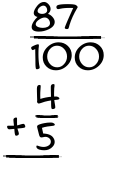What is 87/100 + 4/5?

|
Here's how to add
|
|||||||||||
Step 1Our denominators (bottom numbers) don't match, so we can't add yet. Since 5 is evenly divided by 100, we can multiply just one term to get a common denominator. Multiply 4 by 20, and get 80, then we multiply 5 by 20 and get 100. So now our fractions look like this:
|
|||||||||||
Step 2Since our denominators match, we can add the numerators. 87 + 80 = 167 Now we have an answer.
|
|||||||||||
Step 3Last of all, we need to simplify the fraction, if possible. Can it be reduced to a simpler fraction? To find out, we try dividing it by 2... Nope. Try the next prime number, 3... Nope. Try the next prime number, 5... Nope. Try the next prime number, 7... Nope. Try the next prime number, 11... Nope. Try the next prime number, 13... Nope. Try the next prime number, 17... Nope. Try the next prime number, 19... Nope. Try the next prime number, 23... Nope. Try the next prime number, 29... Nope. Try the next prime number, 31... Nope. Try the next prime number, 37... Nope. Try the next prime number, 41... Nope. Try the next prime number, 43... Nope. Try the next prime number, 47... Nope. Try the next prime number, 53... Nope. Try the next prime number, 59... Nope. Try the next prime number, 61... Nope. Try the next prime number, 67... Nope. Try the next prime number, 71... Nope. Try the next prime number, 73... Nope. Try the next prime number, 79... Nope. Try the next prime number, 83... Nope. Try the next prime number, 89... Nope. Try the next prime number, 97... Nope. Try the next prime number, 101... No good. 101 is larger than 100. So we're done reducing. Congratulations! Here's your final answer to 87/100 + 4/5
|